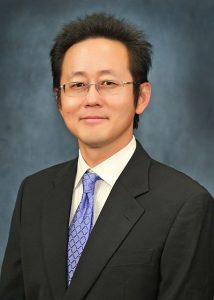Project Led by ECE Professor Receives NSF Award
March 31, 2023
Department of Electrical and Computer Engineering Associate Professor Seungdeog Choi is part of a team recently awarded over $500,000 from the National Science Foundation (NSF).
 Choi is the Principal Investigator of PFI-RP: High-Reliability Low-Cost Rare-Earth Free Electric Motor for Electrified Transportation Applications, which will focus on designing high-reliability and low-cost electric motors.
Choi is the Principal Investigator of PFI-RP: High-Reliability Low-Cost Rare-Earth Free Electric Motor for Electrified Transportation Applications, which will focus on designing high-reliability and low-cost electric motors.
MSU’s Aerospace Engineering Assistant Professor Han-Gyu Kim serves as the Co-Principal Investigator, and other team members include Chris Bounds and Hunter Watts from the Advanced Composites Institute, as well as industry partners PowderMet Inc. and Nexteer Automotive.
The NSF funds will support the development of a commercially-viable rare-earth material-free electric motor with new design and analysis tools. The results could transform current design practices, seamlessly integrating low-cost, high-performance rare-earth-free magnet materials into the wide spectrum of clean energy systems.
“The proposed project is a cross-disciplinary applied research and development, spanning from advanced magnet materials and thermal analysis in mechanical engineering to solving electromagnetic field, torque, power generation, and efficiency problems in electrical engineering,” Choi said. “Designing the new high-reliability and low-cost electric motor for target market segmentation in the electrified transportation industry is novel and transformative.”
The developed solution could be a game-changer for highly efficient, reliable, compact, and low-cost motors and generators in the domestic and international electrified transportation industry. It would also help accelerate faster and easier migrations toward clean energy generation and consumption while avoiding global supply chain disruption of critical minerals and limiting fossil energy usage and CO2 emissions.
“The unique design procedure with a 3-dimension thermal analysis and optimizer can generate several hundred design candidates with new non-rare earth magnet material as an alternative to the rare-earth magnets,” Choi added. “By understanding the fundamental mechanism of demagnetization risk of non-rare earth magnets and their thermal properties, the proposed research will significantly impact highly reliable next-generation motor and clean energy systems and derive energy-efficient, lost-cost design and control strategies.”
To learn more about Dr. Choi’s areas of interest, visit his ECE faculty page.
The Department of Electrical and Computer Engineering at Mississippi State University consists of 27 faculty members (including seven endowed professors), seven professional staff, and over 700 undergraduate and graduate students, with approximately 100 being at the Ph.D. level. With a research expenditure of over $14.24 million, the department houses the largest High Voltage Laboratory among North American universities.
